Politics
Climate change is central to both Pope Francis and Newsom. But do Catholic voters care?
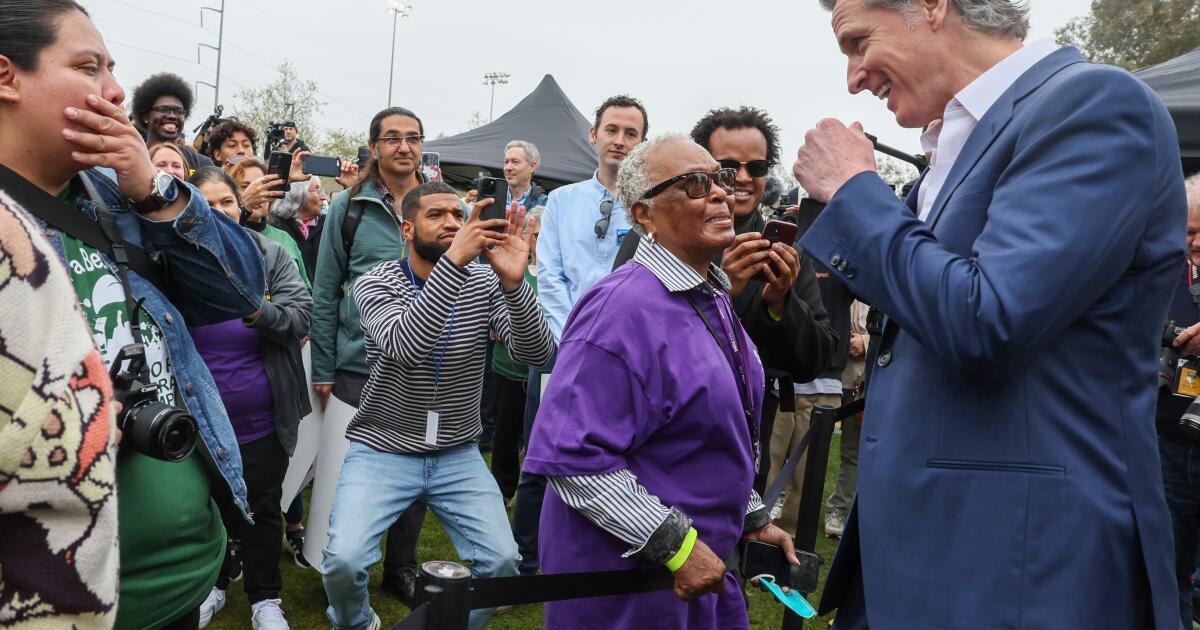
Democratic Gov. Gavin Newsom’s speech on climate change at the Vatican this week gives him an opportunity to align himself and his party with Pope Francis, an influential figure among American Catholics and a leader in the fight against global warming.
But the California governor and the pope’s messages about reducing emissions may not sway American Catholics voting in the 2024 election, especially a monumental presidential contest that could alter national and global climate policies for generations.
Despite the high importance of elections to their shared climate concerns, the issue doesn’t historically drive the pope’s Catholic flock — or typical U.S. voters — to the polls. Catholics appear poised to back Donald Trump, a president who denies global warming and has threatened to reverse environmental protections, over a climate advocate in President Biden, according to a recent Pew Research Center survey.
“It’s not really a top tier issue,” said John K. White, an emeritus professor of politics at Catholic University of America. “But sometimes you have to put what you see as the interests of the country, and in this case, the world, ahead of how you think it’s going to play politically.”
Shortly before the governor boarded a plane bound to Rome on Tuesday, Newsom told reporters he plans to discuss the “leading initiatives” California has taken to address the crisis.
“No state has more to lose, not just more to gain, in terms of addressing climate change,” Newsom said at a news conference on mental health and homelessness in San Mateo County.
Pope Francis is the first pontiff to make climate change central to his papacy, and wrote a 2015 encyclical that relied on scientific facts about global warming to deliver a moral call to preserve the planet for future generations. He offered a second, more-aggressive decree last fall with another paper, called “Laudate Deum,” or “Praise God,” that challenged countries to protect God’s creation and commit to end the use of fossil fuels before it’s too late.
Pope Francis waves as he leaves after a meeting with elderly priests at the San Giuseppe al Trionfale Parish Church in Rome on Tuesday.
(Alessandra Tarantino / Associated Press)
The pope’s climate advocacy, however, has not been fully embraced by deeply divided Catholic voters in the U.S., who vote more like the general electorate than strictly theological voters.
“They have concerns about climate, but that doesn’t rank nearly as high as the economy and they tend to be much more ethnic voters certainly than theological voters,” said Mike Madrid, a Republican political consultant based in California.
Though the pope has been critical of Trump’s U.S.-Mexico border policies, he does not formally endorse one presidential candidate over another and avoids directly meddling in U.S. elections. He influences policy through his own advocacy, such as gathering governors and mayors from around the globe to the climate summit at the Vatican this week to testify about how climate change has affected their own communities.
American bishops, as a group, are more conservative than the pope and have been active in elections. Bishops voted last year to make abortion the church’s political priority in the 2024 election. Some bishops have embraced Trump, who made good on a campaign promise to overturn Roe v. Wade.
The U.S. Conference of Catholic Bishops considered voting in 2021 to refuse communion to Catholic politicians who support abortion rights, including Biden. The Vatican warned the conference against doing so and the bishops ultimately stopped short of a ban.
A pro-Trump faction of white Catholics feels threatened by the growing power of more liberal Latino Catholics within the church and resists the pope’s more-progressive policies, White said. They also tend to care more about abortion rights.
Latino Catholics, who favor Biden by a slim margin, are more concerned about the environment than their white peers, though the economy and immigration typically rank higher than climate change, according to White, Madrid and Pew data.
“They care about feeding their kids more than they are worried about these larger global issues,” Madrid said.
The views of Catholic voters are similar to the overall electorate. In a New York Times Poll conducted in late April and early May, U.S. registered voters ranked the economy as the most important single issue in the 2024 election, followed by immigration and abortion.
Aides to the governor say Newsom’s trip is focused on the existential worldwide environmental threat and isn’t a political calculation.
The governor is going to the Vatican as an evangelist on climate change and to testify about California’s experience and leadership, said Sean Clegg, a senior political advisor to Newsom.
“To be seen as a leader, and California is not just a national leader, but it’s really truly a global leader, you have to stand up and tell your story,” Clegg said.
Newsom’s predecessor, Gov. Jerry Brown, blasted former President Trump’s climate policies during a speech at the Vatican in 2017 that intentionally exposed the divide between California and the White House to the world.
Newsom is expected to call out climate skeptics and oil and gas companies that profit off the burning of fossil fuels, and demand that world leaders consider the grave implications of elections in the U.S. and abroad this year. But he is not expected to mention Trump by name in his address to the pope and international leaders.
Newsom will undoubtedly hype the state’s climate policies, including efforts to meet the goal of reaching carbon neutrality by 2045 and ambitions to phase out new gas-powered vehicles, and reference his own battles with oil companies. The governor will also offer testimony about the historic wildfires that have decimated California rural towns, floods that have ravaged picturesque coastal communities and years of drought that altered the state’s farmlands.
Outside the conference, Newsom is expected to sit down with the president of Italy and the mayor of Rome and travel to Bologna to sign a memorandum of understanding on addressing climate change. On a trip to Asia last fall, the California governor reached similar agreements with China, the provinces of Guangdong and Jiangsu, and the municipalities of Beijing and Shanghai.
For Newsom, meeting with the leader of the Catholic Church will almost assuredly enhance his national and worldwide political profile.
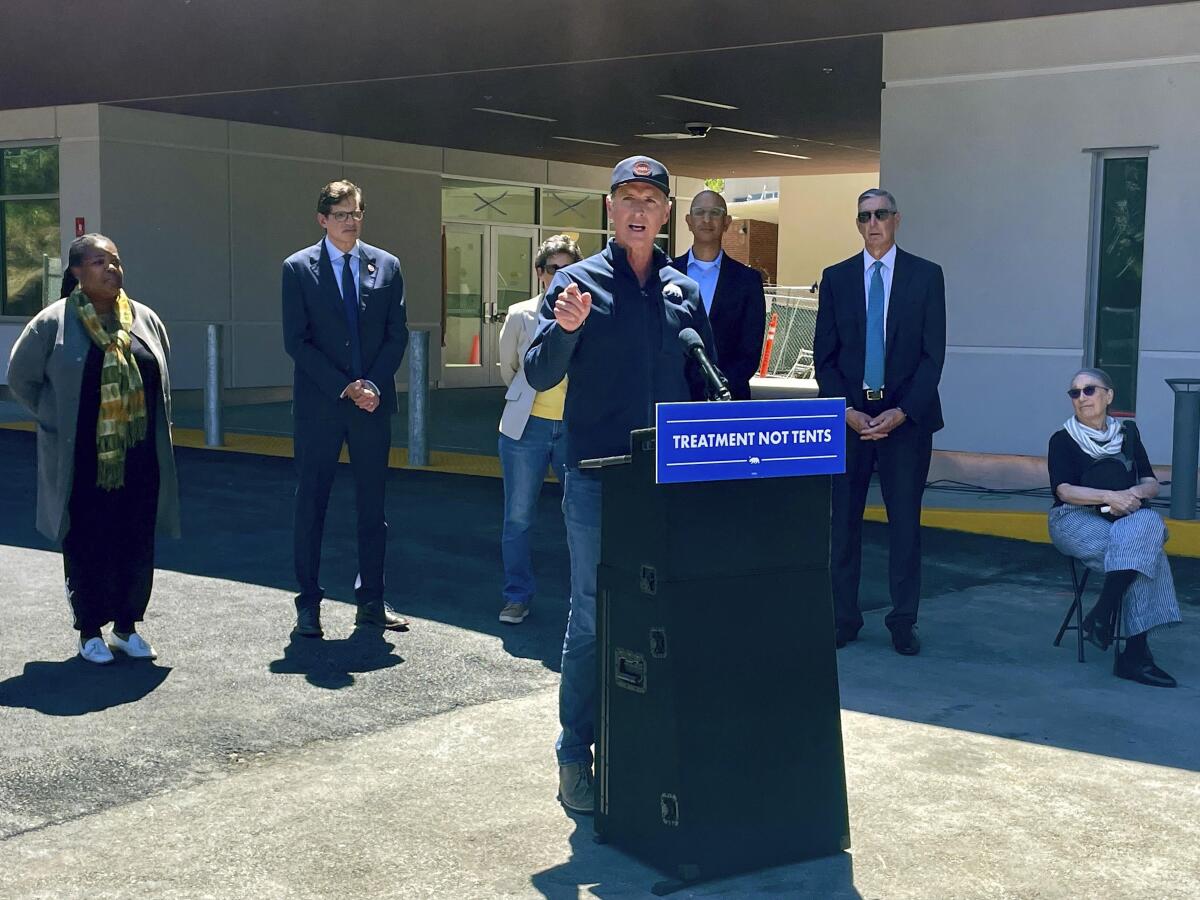
California Gov. Gavin Newsom speaks at a news conference Tuesday in San Mateo. Under mounting pressure to address the growing homelessness crisis in California, Newsom announced that his administration will make $3.3 billion available ahead of schedule for counties and private developers to start building more behavioral health treatment centers as part of his efforts to fund housing and drug use programs.
(Haven Daley / Associated Press)
The pope enjoys a 75% approval rating among U.S. Catholics and — whether it’s discussing Gaza, Ukraine or the environment — his voice extends beyond the church.
Pope Francis called out the U.S. in his “Laudate Deum” letter last fall, pointing out that its emissions per individual are about two times greater than China‘s and about seven times greater than the average of the poorest countries in the world, said Mary Novak, executive director of the nonprofit NETWORK Lobby for Catholic Social Justice.
Newsom’s trip to the Vatican also gives him a chance to promote the state’s environmental agenda just days after he announced a proposal to reduce spending on climate change in California by $3.6 billion to close a budget deficit.
Being seen as a leader on climate in a country that the pope has criticized could benefit the governor. Massachusetts Gov. Maura Healy and Boston Mayor Michelle Wu are also attending the conference.
“These are leaders who have been fighting climate change and [for] the transition to a clean energy economy for a very long time,” Novak said.
She added that it’s smart for the Pontifical Academy of Sciences to invite leaders who can address climate change in their own states and communities to the conference, which is geared around slowing global warming and reducing emissions but also adapting to the reality of rising seas and hotter temperatures.
Newsom’s visit could deepen his standing with climate activists and young people, who care more about the environment than their parents.
“Being seen with the pope is still beneficial,” White said. “The Holy See is an important player on the world stage, not only in climate change, but also in diplomacy.”
Times Staff Writer Anabel Sosa contributed to this report.

Politics
Park Police union says officers ‘did everything they could’ during DC anti-Israel riot

Following the protests at Union Station by anti-Israel agitators defacing federal property in protest of Israeli Prime Minister Benjamin Netanyahu’s address to Congress, a Park Police union is pushing back against criticism that only a few arrests were made.
Thousands of Hamas-sympathizing agitators descended on Washington, D.C., Tuesday, at one point defacing federal monuments with phrases in support of the terrorist group responsible for the Oct. 7 attacks in Israel, saying, “Hamas is coming.”
Twenty-three people were arrested at the protests, but some have suggested that number should have been higher.
Sen. Marco Rubio, R-Fla., posted on X, “How many more times are they going to allow leftist degenerates who support terrorism and hate America to vandalize property and attack police? There should have been hundreds of arrests today in D.C. not just 23.”
HOUSE REPUBLICANS REPLACE AMERICAN FLAGS AT UNION STATION AFTER ANTI-ISRAEL PROTESTS
The Columbus Memorial Fountain at Union Station during an anti-Israel protest on the day Israeli Prime Minister Benjamin Netanyahu addressed a joint meeting of Congress on Capitol Hill in Washington July 24, 2024. (Reuters/Seth Herald)
But the U.S. Park Police Labor Committee is pushing back.
“Our officers on the ground did everything they could to protect life and property. In fact, despite having only 29 officers available to mitigate damage — 29! — with no additional help from the Department of the Interior, we processed several arrests for charges ranging from assault on a police officer to destruction of government property,” Kenneth Spencer, chairman of the United States Park Police Fraternal Order of Police, said in a statement.
“That’s why it’s so disheartening to hear some members of Congress and members of the media, many of whom describe themselves as ‘champions’ of law enforcement, suggesting that officers gave protesters a ‘pass’ or that insufficient arrests were made.
“Nothing could be further from the truth. Anyone who truly cares to understand the problem would see that our officer staffing crisis is at the root of our agency’s mission readiness. A small unit of 29 officers arrested 10 individuals while being assaulted by a mob of thousands. We simply did not have the staffing or resources to accomplish a mass arrest operation.”
SEE IT: THE MOST DRAMATIC PHOTOS FROM WEDNESDAY’S PRO-HAMAS WASHINGTON, D.C. PROTESTS
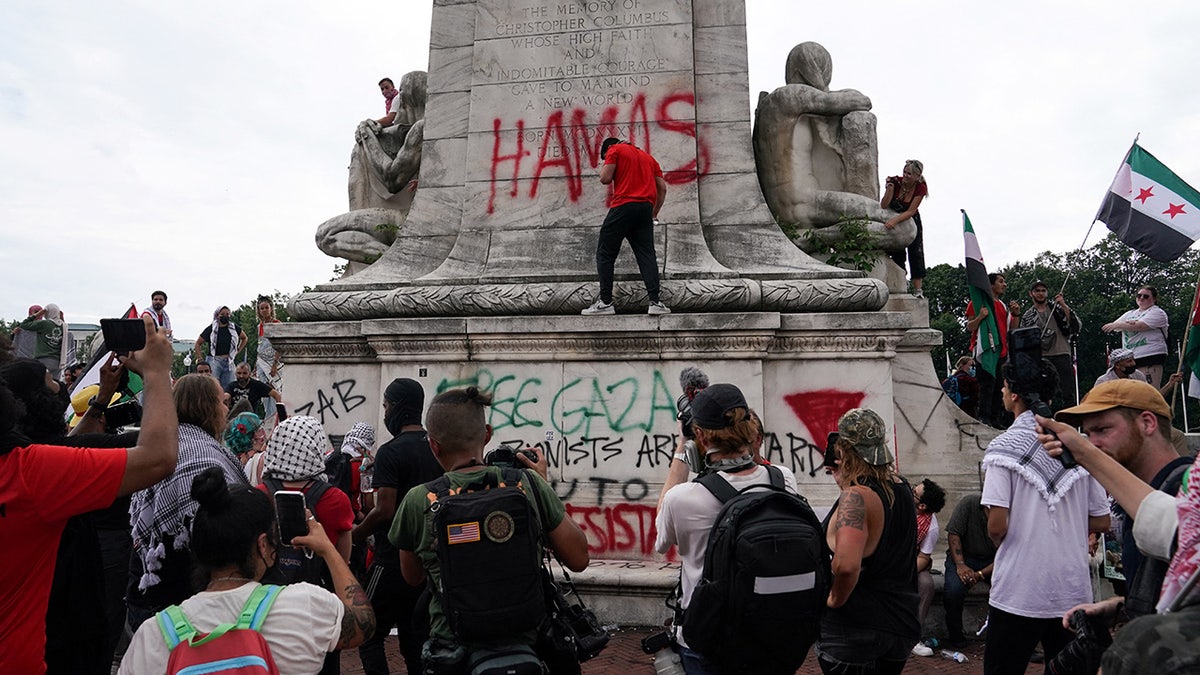
An anti-Israel demonstrator sprays graffiti on the Christopher Columbus Memorial Fountain at Union Station on the day of Israeli Prime Minister Benjamin Netanyahu’s address to a joint meeting of Congress on Capitol Hill in Washington July 24, 2024. (Reuters/Nathan Howard)
At least one demonstrator, whose face was covered, was spotted by Fox News carrying what appeared to be the flag of the terrorist group Hamas while others were heard shouting “Allahu Akbar.”
KAMALA HARRIS REACTS TO ANTI-ISRAEL RIOTS AT DC’S UNION STATION
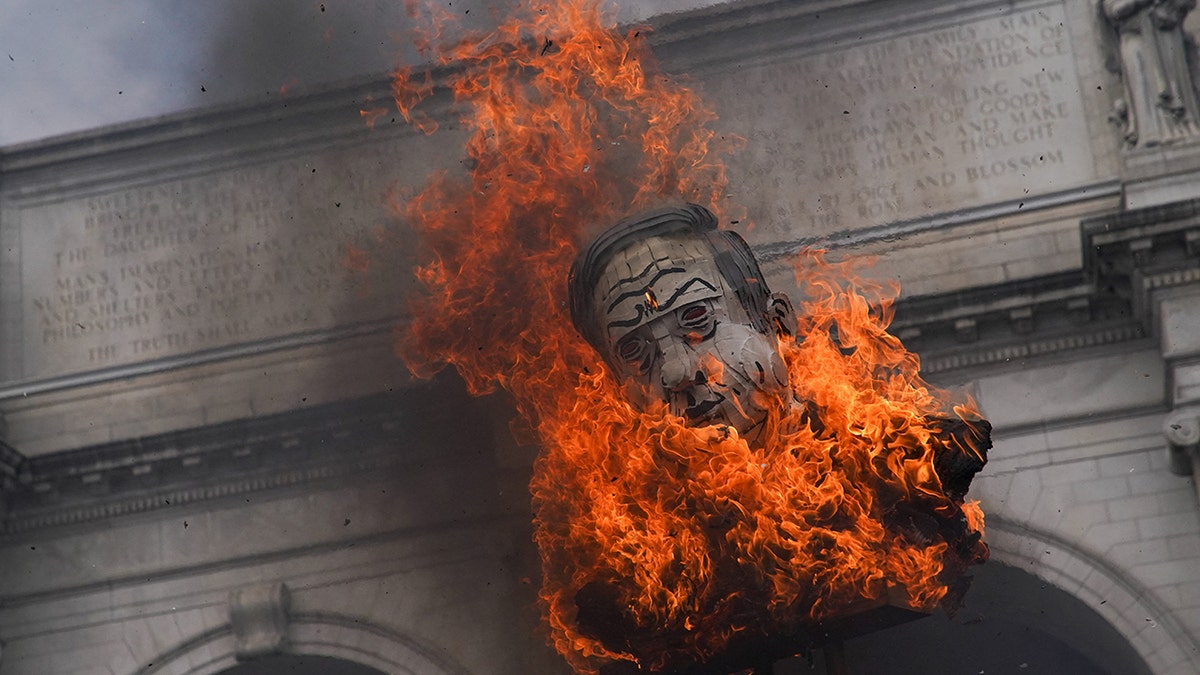
Anti-Israel demonstrators burn an effigy depicting Israeli Prime Minister Benjamin Netanyahu outside Union Station on the day of Netanyahu’s address to a joint meeting of Congress on Capitol Hill in Washington July 24, 2024. (Reuters/Nathan Howard)
The White House condemned the protests Wednesday evening, calling the chaos “disgraceful.”
“Identifying with evil terrorist organizations like Hamas, burning the American flag or forcibly removing the American flag and replacing it with another is disgraceful,” White House spokesperson Andrew Bates said in a comment to Fox News Digital Wednesday evening.
Politics
Ali: Kamala Harris has a campaign soundtrack: Beyoncé's 'Freedom'
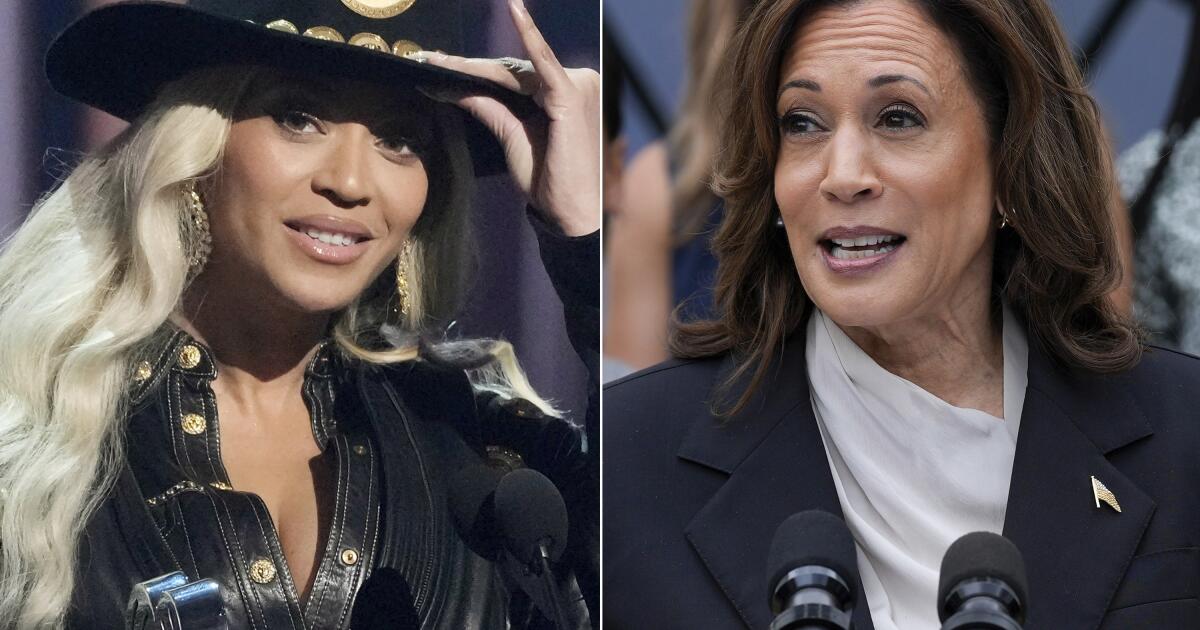
Vice President Kamala Harris’ bid for the presidency has a soundtrack: Beyoncé’s “Freedom.”
The leading Democratic presidential candidate took the stage in her first visit to her Wilmington, Del. campaign headquarters and again during her first campaign rally in Wisconsin as the song played.
Now the cathartic anthem graces Harris’ first campaign ad, in which she says: “There are some people who think that we should be a country of chaos, of fear, of hate. But us? We choose something different: We choose freedom.”
Pit that against the musical number her competitor chose for his grand entrance on Night 3 of the Republican National Conference. Donald Trump walked out to James Brown’s “It’s a Man’s, Man’s, Man’s World,” a tone-deaf choice for a former president found liable for sexual abuse, who’s bragged about sexually assaulting women, a married man who paid hush money to a porn star and a former president who rolled back women’s reproductive rights 50 years with the repeal of Roe vs. Wade.
Maybe the Godfather of Soul would have endorsed Trump’s usage of his song, but Brown would be breaking with decades’ worth of musicians who’ve decried GOP candidates playing their tracks at rallies and booster events. Adele, Rihanna, R.E.M., the Rolling Stones, Prince, Neil Young, Guns N’ Roses and Queen are among the many artists who’ve spoken out against Trump using their tunes for campaign purposes.
Heart bristled when the McCain-Palin campaign used “Barracuda.” Tom Petty insisted George W. Bush back away from “I Won’t Back Down.” Bruce Springsteen decried Ronald Reagan’s appropriation of “Born in the U.S.A.”
Beyoncé, however, gave Harris her blessing to use “Freedom,” a single from her 2016 blockbuster album “Lemonade.” The song, which features guest rapper Kendrick Lamar, is an explosive expression of empowerment. At the time of its release, it spoke to public outcry around police killings of unarmed Black men and women — Eric Garner, Tamar Rice, Freddie Gray — and protests that were largely fueled by the ire of younger generations.
Whether Beyoncé was singing about the tyranny of a cheating spouse or racial injustice (or both), the song became an anthem for a new, potentially potent block of the American electorate.
For the first time, Gen Z and millennials could now account for as many votes as baby boomers and their elders, groups that have made up a majority of the electorate for decades.
Folks under 40 have grown up with Beyoncé and her ubiquitous work. Think of Beyoncé like the Who for boomers — their work is everywhere (Republican Sen. Rand Paul played the band’s anti-war hit “Baba O’Riley” when he campaigned in 2015) — or Nirvana for Gen X, except no one cares what we think. Whatever, nevermind.
The Harris campaign’s smart choice of music coincides with a willingness to lean into a meme culture that shot up organically around the 59-year-old VP since President Biden announced Sunday that he was dropping out of the race.
Pop star Charli XCX showed her support for Harris when she tweeted “Kamala IS brat.” The British singer is referring to the TikTok and Twitter edits of Harris’ image superimposed to songs from Charli XCX’s hit album “Brat.” The avalanche of memes come from a video clip in which Harris talks about her mother’s response to the hubris of youth: “You think you just fell out of a coconut tree? You exist in the context of all in which you live and what came before you.”
Right-wing social media used the quote to deride Harris as inarticulate and a “word salad” master, but liberal swaths of Gen Z have since reworked the clip into emojis and memes that celebrate Harris’ nonconformist approach. She’s become a viral sensation, in a good way, unlike J.D. Vance’s damning “single cat lady” memes and a cringey internet joke about encounters with couches.
It’s rare that relevant talent will shill for a Republican candidate. Case in point: Trump’s pop culture ambassadors at this year’s RNC were Kid Rock, Kanye’s ex Amber Rose and former WWE wrestler Hulk Hogan, whose big moment was ripping his shirt off and screaming “Let Trump mania run wild!”
Harris chose to let freedom ring, and she has Queen Bey behind her.
Politics
Texas sues Biden administration over program giving birth control to teens without parents' knowledge

Texas officials are challenging a recent order from President Biden’s administration that would allow schools to distribute birth control to teenagers without parental consent.
Texas Attorney General Ken Paxton announced Thursday that his office is suing the Biden administration over their 2021 change to Title X guidelines banning parental consent requirements for birth control services.
“By attempting to force Texas healthcare providers to offer contraceptives to children without parental consent, the Biden Administration continues to prove they will do anything to implement their extremist agenda — even undermine the Constitution and violate the law,” Paxton said in a statement.
TRUMP SAYS HE ‘WILL NEVER ADVOCATE IMPOSING RESTRICTIONS ON BIRTH CONTROL’ OR OTHER CONTRACEPTIVES
A woman takes the next pill from a monthly pack of contraceptive pills. (Annette Riedl/picture alliance via Getty Images)
The Texas legal battle began in Dec. 2021 when US District Judge Matthew Kacsmaryk ruled that Title X — the federal program that provides free, confidential contraception to anyone regardless of age, income or immigration status — violates parental rights and violates state and federal laws.
The case was argued by former solicitor general of Texas Jonathan Mitchell, representing father Alex Deanda, who said he was “raising each of his daughters in accordance with Christian teaching on matters of sexuality, which requires unmarried children to practice abstinence and refrain from sexual intercourse until marriage.”
SCHUMER PLANS VOTE ON ‘CONSTITUTIONAL RIGHT TO CONTRACEPTION’ IN BID TO PROTECT SENATE DEMOCRAT MAJORITY
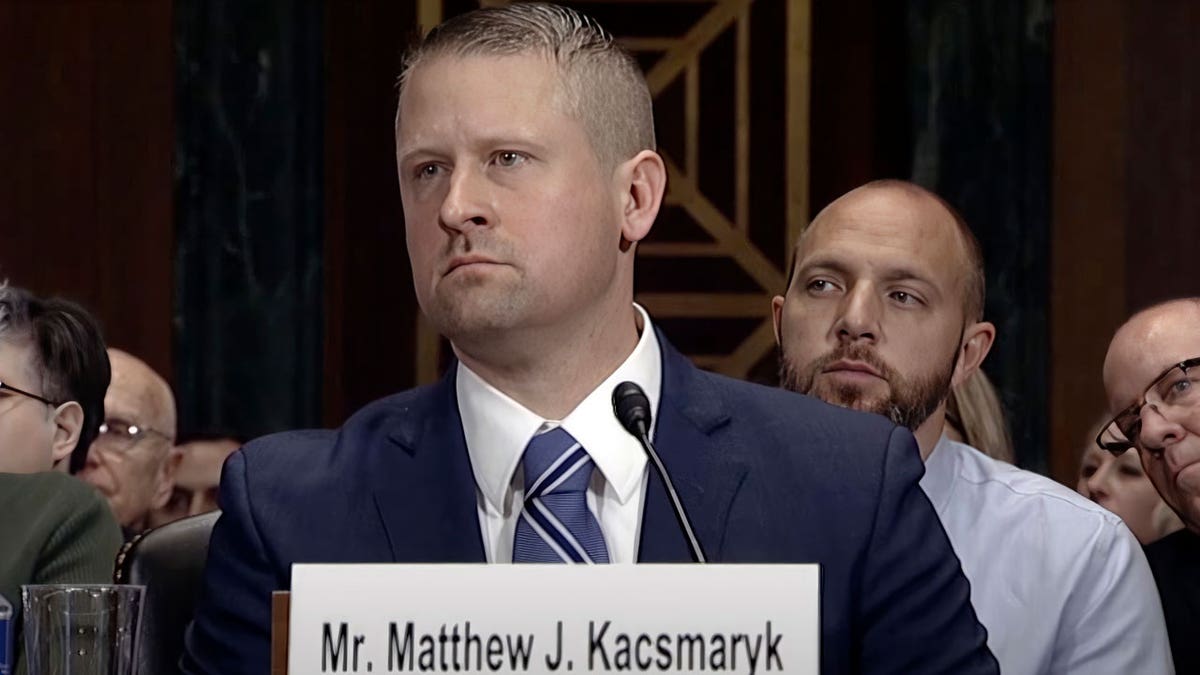
Kacsmaryk, a Trump appointee, previously ruled that parents must be informed when birth control is provided to their children under 18 years old. (Senate Judiciary Committee via AP)
In response, the federal government updated guidelines to state that Title X projects “may not require consent of parents or guardians for the provision of services to minors, nor can any Title X project staff notify a parent or guardian before or after a minor has requested and/or received Title X family planning services.”
Paxton is now seeking a permanent injunction on this rule, which he claims defies the findings of the federal court.
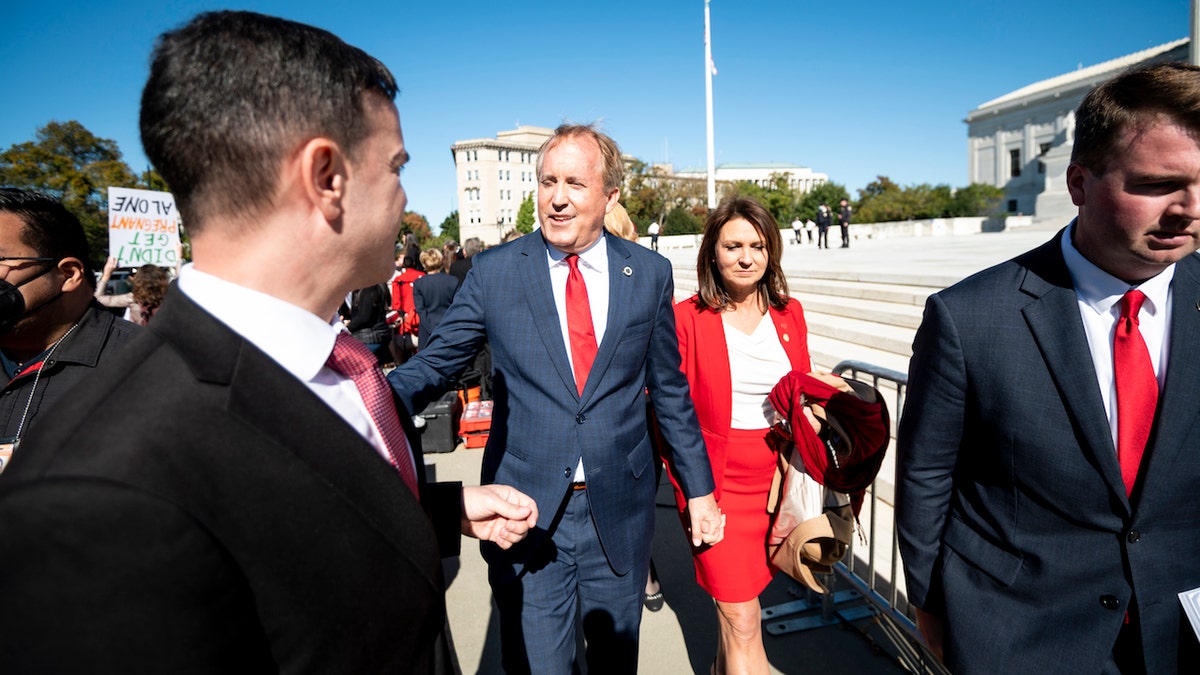
Paxton and his wife Angela are pictured outside the Supreme Court. (Bill Clark/CQ-Roll Call, Inc via Getty Images)
Paxton filed the lawsuit in a federal court in Amarillo. It will likely be heard by Kacsmaryk, the same judge who previously ruled parents must be informed of birth control provided to their children.
-

 World1 week ago
World1 week agoOne dead after car crashes into restaurant in Paris
-

 Midwest1 week ago
Midwest1 week agoMichigan rep posts video response to Stephen Colbert's joke about his RNC speech: 'Touché'
-

 News1 week ago
News1 week agoVideo: Young Republicans on Why Their Party Isn’t Reaching Gen Z (And What They Can Do About It)
-

 Movie Reviews1 week ago
Movie Reviews1 week agoMovie Review: A new generation drives into the storm in rousing ‘Twisters’
-

 News1 week ago
News1 week agoIn Milwaukee, Black Voters Struggle to Find a Home With Either Party
-

 Politics1 week ago
Politics1 week agoFox News Politics: The Call is Coming from Inside the House
-

 News1 week ago
News1 week agoVideo: J.D. Vance Accepts Vice-Presidential Nomination
-

 World1 week ago
World1 week agoTrump to take RNC stage for first speech since assassination attempt













